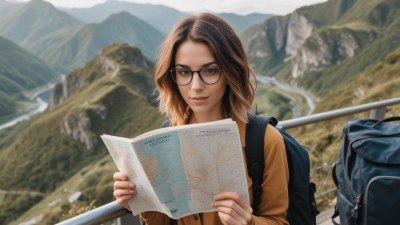The Psychology of Travel and Why It Changes You
Explore how travel shapes your psyche and transforms your perspectives while broadening your horizons.

Travel is one of the most enriching experiences one can undertake, yet its impact on the human psyche is profound and multifaceted. As we traverse new landscapes, cultures, and environments, our mental and emotional frameworks are challenged and reshaped. The psychology of travel delves into how these experiences modify our behaviors, beliefs, and perceptions. In this article, we will explore various aspects of this transformative journey, highlighting the ways travel influences our thoughts, emotions, and overall well-being.
At its core, travel is about exploration. Whether venturing to a new city or immersing oneself in a different culture, the very act of stepping outside familiar surroundings disrupts our routines. This disruption can trigger a series of psychological responses. According to Maslow's hierarchy of needs, once basic physiological and safety needs are met, individuals seek belonging and esteem. Travel provides a unique avenue for self-esteem enhancement through diverse experiences, which can lead to personal growth and development.
One significant psychological aspect of travel is its ability to foster emotional resilience. Encountering unfamiliar environments and cultures often requires individuals to adapt and overcome challenges. Whether navigating through language barriers or facing unexpected situations, travelers develop problem-solving skills that enhance their confidence and resilience. Research has shown that overcoming such challenges contributes to an increase in psychological flexibility, allowing individuals to better handle stress and uncertainty in their daily lives.
Moreover, travel promotes mindfulness and presence. Disconnecting from routine and immersing oneself in the present moment enhances awareness and appreciation of experiences. Mindfulness during travel can lead to increased happiness and contentment. Engaging with new sights, sounds, and feelings encourages open-mindedness and curiosity, which are fundamental for psychological well-being. Integrating these mindful practices while traveling can translate to improved mental health long after the journey ends.
The Role of Culture in Shaping Identity
Culture plays a pivotal role in the psychological effects of travel. Exposure to diverse customs, traditions, and worldviews challenges preconceived notions and expands our cognitive frameworks. This exposure catalyzes growth by promoting empathy and understanding. Psychologists argue that interacting with people from different backgrounds enhances social cognition. Travelers often find themselves reflecting on their values and beliefs, leading to a more nuanced understanding of identity and self-concept.
Additionally, cultural immersion creates opportunities for self-discovery. Engaging with locals, participating in traditional practices, or simply observing the daily lives of others can prompt deep introspection. These experiences lead to the exploration of personal values, beliefs, and motivations. The result is often a more authentic version of oneself, as individuals reevaluate their lifestyle choices, relationships, and aspirations.
This transformation isn’t limited to mere self-discovery; it can also enhance one’s emotional intelligence. As travelers navigate through various social dynamics, they become adept at reading social cues and understanding emotional expressions. These skills are transferable to personal and professional relationships, fostering better connections in everyday life. Consequently, travel contributes to an elevated sense of interpersonal understanding and compassion.
Overcoming Fear and Anxiety through Travel
For many, travel can evoke feelings of fear and anxiety, stemming from the unknown. However, confronting these fears is a crucial psychological journey in itself. Traveling often necessitates stepping out of one’s comfort zone, which can be therapeutic. By facing fears—whether the fear of flying, navigating foreign environments, or social interactions—individuals learn to cultivate courage. Each conquered fear serves as a building block for confidence, reinforcing a belief in one's ability to handle diverse situations.
This process of overcoming anxiety is supported by therapeutic concepts such as exposure therapy. Gradually facing and mastering travel-related fears can lead to significant psychotherapeutic benefits. Furthermore, the thrill-seeking aspect of travel can also contribute to heightened levels of dopamine, the neurotransmitter associated with pleasure. The rush of exploration can evoke feelings of excitement and joy, positively influencing mood and mental well-being.
Additionally, travel has shown to stimulate creativity. The variety of experiences, sights, and interactions sparks creative thinking, providing the mental flexibility to approach problems differently. Exposure to new ideas and perspectives can lead to innovative solutions in both personal and professional endeavors. Numerous studies highlight a correlation between travel, creative thinking, and cognitive flexibility. This is particularly relevant in today’s fast-paced, globalized world, where adaptability and innovation are paramount.
The Transformative Power of Travel Experiences
Travel experiences leave lasting impressions. The memories created during journeys shape our emotional landscapes, influencing future behaviors and decisions. Whether it’s fostering a love for adventure, cultivating an appreciation for different cultures, or instilling wanderlust in one’s soul, these experiences resonate on a deep psychological level. The power of narrative associated with travel allows individuals to recount their adventures, reinforcing personal identity and connection with others.
Moreover, travel encourages gratitude. Engaging with diverse communities and witnessing varying lifestyles often leads to an appreciation for one's circumstances. This newfound perspective can foster a greater sense of gratitude and mindfulness in everyday life. Studies have shown that practicing gratitude is linked to improved mental health outcomes, increased life satisfaction, and enhanced resilience.
Social Connections and Loneliness
In an increasingly digital age, many people experience feelings of loneliness and disconnection. Travel presents an antidote to this modern dilemma by fostering social connections beyond borders. Meeting people from various backgrounds creates a sense of belonging and camaraderie, alleviating feelings of isolation. Shared experiences during travel often forge deep bonds that transcend conventional relationships. The friendships formed on the road can be some of the most rewarding, offering diverse perspectives and lifelong connections.
Travel can also serve as a catalyst for fostering existing relationships. Shared adventures with family and friends can deepen bonds, allowing individuals to create lasting memories together. Engaging in unique experiences amplifies the joy of companionship, ultimately enhancing relational satisfaction. By stepping away from the routine, couples, friends, and families often rediscover the joy and intimacy of their relationships.
The Long-term Effects of Travel on Personal Development
The psychological impact of travel extends beyond the immediate experiences. Research indicates that individuals who travel frequently tend to exhibit greater resilience, adaptability, and open-mindedness in their daily lives. The skills cultivated during travel—adaptability, problem-solving, and emotional intelligence—contribute to personal development throughout an individual's life journey. This ongoing transformation can facilitate successful navigation of life’s challenges, making travelers better equipped to embrace change and uncertainty.
Furthermore, the stimulation of sensory experiences during travel cannot be overlooked. New environments engage our senses in profound ways. The sounds, sights, and flavors encountered can elevate mood and enhance overall well-being. Engaging our senses is essential for maintaining mental acuity and emotional balance, promoting cognitive health as we age.
In conclusion, the psychology of travel is a multifaceted domain that significantly impacts our lives in various ways. From enhancing emotional resilience and fostering empathy to promoting personal growth and creativity, the transformative effects of travel are undeniable. By stepping outside our comfort zones and immersing ourselves in the beauty of diverse cultures, we embark on a journey of self-discovery that reshapes our understanding of the world and, ultimately, ourselves. The next time you plan your travels, remember that each journey is not just about the destination, but also about the profound psychological shift it can instigate. Embrace the adventure, and let the world change you.











